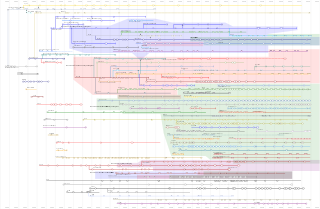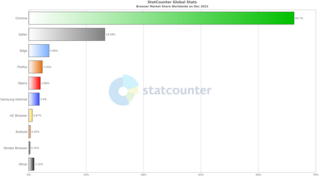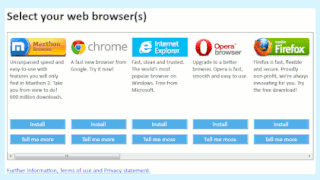Gecko is a browser engine developed by Mozilla. It is used in the Firefox browser, the Thunderbird email client, and many other projects.

Mozilla Firefox, or simply Firefox, is a free and open-source web browser developed by the Mozilla Foundation and its subsidiary, the Mozilla Corporation. It uses the Gecko rendering engine to display web pages, which implements current and anticipated web standards. Firefox is available for Windows 10 or later versions, macOS, and Linux. Its unofficial ports are available for various Unix and Unix-like operating systems, including FreeBSD, OpenBSD, NetBSD, illumos, and Solaris Unix. It is also available for Android and iOS. However, as with all other iOS web browsers, the iOS version uses the WebKit layout engine instead of Gecko due to platform requirements. An optimized version is also available on the Amazon Fire TV as one of the two main browsers available with Amazon's Silk Browser.

A browser war is a competition for dominance in the usage share of web browsers. The "first browser war," (1995–2001) pitted Microsoft's Internet Explorer against Netscape's Navigator. Browser wars continued with the decline of Internet Explorer's market share and the popularity of other browsers, including Firefox, Google Chrome, Safari, Microsoft Edge and Opera.
This is a comparison of both historical and current web browsers based on developer, engine, platform(s), releases, license, and cost.
Trident is a proprietary browser engine for the Microsoft Windows version of Internet Explorer, developed by Microsoft.

Minimo was a project to create a version of the Mozilla web browser for small devices like personal digital assistants and mobile phones.

The usage share of web browsers is the portion, often expressed as a percentage, of visitors to a group of web sites that use a particular web browser.

Internet Explorer Mobile was a mobile version of Internet Explorer developed by Microsoft, based on versions of the MSHTML (Trident) layout engine. IE Mobile comes loaded by default with Windows Phone and Windows CE. Later versions of Internet Explorer Mobile are based on the desktop version of Internet Explorer. Older versions however, called Pocket Internet Explorer, are not based on the same layout engine.

The Mozilla Corporation is a wholly owned subsidiary of the Mozilla Foundation that coordinates and integrates the development of Internet-related applications such as the Firefox web browser, by a global community of open-source developers, some of whom are employed by the corporation itself. The corporation also distributes and promotes these products. Unlike the non-profit Mozilla Foundation, and the Mozilla open source project, founded by the now defunct Netscape Communications Corporation, the Mozilla Corporation is a taxable entity. The Mozilla Corporation reinvests all of its profits back into the Mozilla projects. The Mozilla Corporation's stated aim is to work towards the Mozilla Foundation's public benefit to "promote choice and innovation on the Internet."

Sleipnir is a tabbed web browser developed by Fenrir Inc. The browser's main features are customization and tab functions. It supports HTML5 and multiple layout engines.
This is a timeline of web browsers from 1990 to the present. Prior to browsers, many technologies and systems existed for information viewing and transmission. For an in-depth history of earlier web browsers, see the web browser article.

A site-specific browser (SSB) is a software application that is dedicated to accessing pages from a single source (site) on a computer network such as the Internet or a private intranet. SSBs typically simplify the more complex functions of a web browser by excluding the menus, toolbars and browser GUI associated with functions that are external to the workings of a single site. These applications are typically started by a desktop icon which is usually a favicon.

Google Chrome is a web browser developed by Google. It was first released in 2008 for Microsoft Windows, built with free software components from Apple WebKit and Mozilla Firefox. Versions were later released for Linux, macOS, iOS, and also for Android, where it is the default browser. The browser is also the main component of ChromeOS, where it serves as the platform for web applications.

Mozilla Firefox 3.5 is a version of the Firefox web browser released in June 2009, adding a variety of new features to Firefox. Version 3.5 was touted as being twice as fast as 3.0. It includes private browsing, has tear-off tabs, and uses the Gecko 1.9.1 engine. It was codenamed Shiretoko during development, and was initially numbered Firefox 3.1 before Mozilla developers decided to change the version to 3.5, to reflect the inclusion of a significantly greater scope of changes than were originally planned. It is the last major version to support X BitMap images.

WebGL is a JavaScript API for rendering interactive 2D and 3D graphics within any compatible web browser without the use of plug-ins. WebGL is fully integrated with other web standards, allowing GPU-accelerated usage of physics, image processing, and effects in the HTML canvas. WebGL elements can be mixed with other HTML elements and composited with other parts of the page or page background.

BrowserChoice.eu was a website created by Microsoft in March 2010 following a decision in the European Union Microsoft competition case. The case involved legal proceedings by the European Union against Microsoft and found that, by including Internet Explorer with their market-dominant Windows operating system, Microsoft had used this dominance to create a similar market position in the web browser market. The BrowserChoice.eu website was created to allow users that had not made, or were unaware of, a choice to try other browsers, and thus comply with the European Commission's ruling.

Firefox OS is a discontinued open-source operating system – made for smartphones, tablet computers, smart TVs, and dongles designed by Mozilla and external contributors. It is based on the rendering engine of the Firefox web browser, Gecko, and on the Linux kernel. It was first commercially released in 2014.
Mozilla is a free software community founded in 1998 by members of Netscape. The Mozilla community uses, develops, publishes and supports Mozilla products, thereby promoting exclusively free software and open standards, with only minor exceptions. The community is supported institutionally by the non-profit Mozilla Foundation and its tax-paying subsidiary, the Mozilla Corporation.

Torch was a Chromium-based web browser and Internet suite developed by the North Carolina–based Torch Media. As of November 2022, downloads for Torch are no longer available, and upon clicking the download button, users are redirected to the Torch Search extension on the Chrome Web Store.













